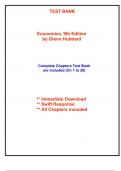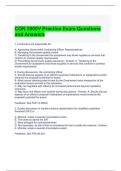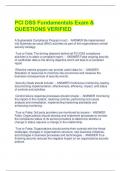Exam (elaborations)
Test Bank for Economics, 9th Edition by Hubbard (All Chapters included)
- Course
- Institution
Complete Test Bank for Economics, 9th Edition by Glenn Hubbard, Anthony P. O'Brien ; ISBN13: 9780357717417....(Full Chapters included and organized in reverse order from Chapter 28 to 1)...1.Economics: Foundations and Models 2.Trade-offs, Comparative Advantage, and the Market System 3.Where Price...
[Show more]





